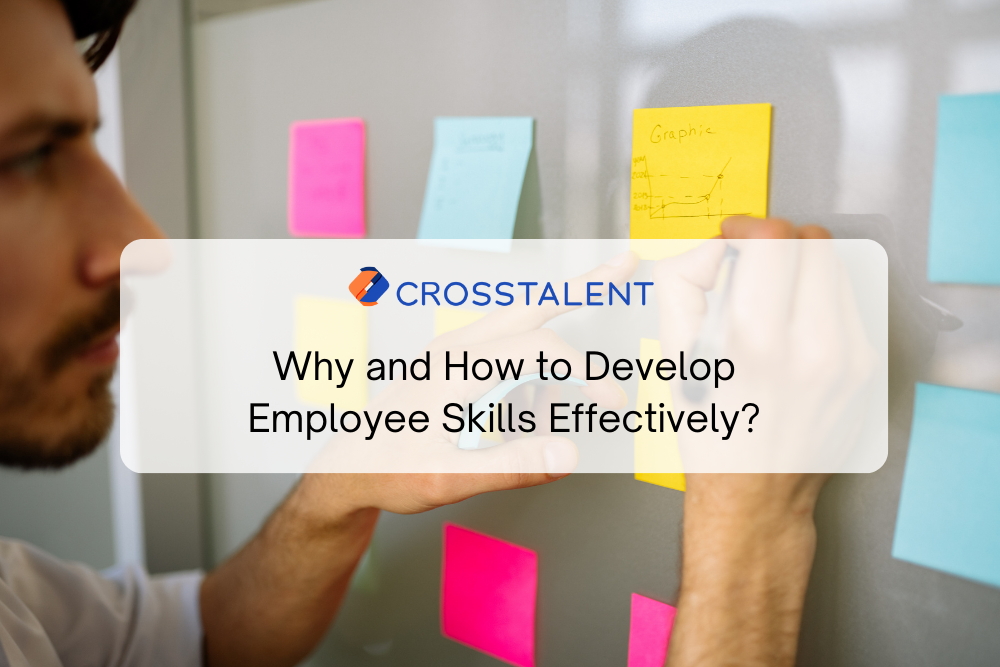Employees are increasingly demanding. If they’re not asking for well-being support, it’s flexible working hours, or development. It’s clear that work culture has changed, and we (employers) must rethink what we offer.
We need to adapt quickly to stay competitive. And that means paying close attention to our employees, particularly in terms of skills development, to help them grow and make them increasingly comfortable and efficient in their jobs.
Additionally, we need to reinforce their skills to support them in situations of technological change. But when we talk about skills, what exactly are we talking about? Read more to find out.
What Does Competency Mean?
Larousse defines competence as “a set of specific dispositions, abilities, and aptitudes that enable any language speaker to master it, and that he or she applies in actual speech acts in concrete situations (which constitutes performance).”
Competence, therefore, also means performance.
From the employer’s point of view, professional competence is a combination of know-how and interpersonal skills. They enable employees to carry out their missions and perform their duties properly.
Finally, let’s not forget the role of the legislator.
Article L.6321-1 of the French Labor Code outlines the employer’s general obligation to provide employee training. Employers must ensure that their employees adapt to their jobs and maintain their ability to hold down a job as it evolves.
Vocational training is a key tool available to all employees. It enables people to take training throughout their careers. This allows them to develop their skills and gain access to new employment, maintain their employment, or change jobs.
Why Should Companies Develop Employees’ Skills?
Let’s take a look at the reasons why you should develop your employees’ competencies.
Developing your employees’ skills means helping them evolve and acquire new knowledge and know-how. A company policy of this kind has many advantages for employees.
The constant nurturing of new knowledge will prevent a lack of interest (and the loss of the skill itself), among other things. As an employer, it’s a good way of building loyalty and offering employees a steady career path.
Another advantage for the employer is to anticipate needs in terms of personnel and skills required to fill available positions and to practice job versatility.
How Can Companies Encourage Employees to Improve Their Skills?
There are three things employers can do to nudge employees to take part in training: focus on recruitment and be attentive to potential, make the most of training, and listen to your employees.
1. Selective Recruitment Process
Recruitment is, unfortunately, not a science—but selecting candidates with potential can be a great asset for the future of the company.
To learn more about the candidate’s personality, during the interview, you’ll need to ask about their biggest successes and failures, motivations to apply for the position, and willingness to move forward. In this way, the employer will know that this candidate has the potential to be further developed.
2. Offer Training
The various categories of actions that contribute to skills development are as follows:
- Training: to acquire a higher qualification, get a job promotion, etc.
- Skills assessment: to redefine a professional project
- Validation of acquired experience: to acquire professional certifications
- Apprenticeship: an excellent way of combining theoretical knowledge with practical experience on the job.
3. Listen to Employee Feedback
Listening to your employees is essential these days, so it’s important not to neglect the annual employee feedback.
These discussions can highlight areas for improvement, qualities that companies can leverage (e.g., for peer training), or even our employees’ unsuspected desire for a career change.
Why Skills Reinforcement Matters for Employees and Employers
Many employers face a significant challenge: preventing skill erosion due to boredom, fostering employee versatility, and recognizing valuable experience.
After years in the same role, employees can become disengaged and lose a sense of purpose. This boredom often leads to a decline in skills, increased errors, and decreased motivation.
The key to combating this? Reinforcing employee skills.
By investing in skill development, both employees and employers reap significant benefits.
Employees experience renewed job satisfaction and increased employability. Employers see a boost in productivity and performance. Additionally, companies can leverage the expertise of senior employees by offering them opportunities to become mentors or training supervisors. This not only reinforces skills but also fosters knowledge transfer within the organization.
How to Develop Your Employees’ Skills Effectively
Reinforcing your employees’ skills doesn’t only mean keeping them up to date with the latest industry trends or training them with the newest software; it also means ensuring their commitment and enthusiasm in their day-to-day work.
It’s a combination of know-how and interpersonal skills.
Once again, listening is very important, and encouraging progress is essential.
From a legal standpoint, employers have an obligation to provide training opportunities. However, employees also have a stake in maintaining their skills for continued career growth. But beyond these obligations, fostering a learning culture aligns perfectly with today’s focus on corporate social responsibility. By prioritizing skill enhancement, you’re not only ensuring your employees’ employability in the long run but also investing in a more productive and adaptable workforce.
You also need to identify employees with high potential and turn them into real assets, such as company successors. This ensures that when the current generation retires, your company remains stable and grows further.
Generally speaking, the French current employment policy places great emphasis on apprenticeships. However, there is no such thing as an apprentice without tutors. For many, it’s a way of reinforcing existing skills by passing on knowledge, which is vital to the long-term future of companies. In the end, it’s also a very easy way of enhancing the career paths and skills of older employees.
In short, developing and reinforcing professional skills means that employees can:
- Climb up to higher or move to new positions
- Keep their skills up to date
- Increase responsibilities
- Improve productivity
On the employer side, your role as a manager is to develop the skills of your employees. To achieve this and to develop the skills of your teams, you can :
- Evaluate the skills your team has
- Focus on leveraging the strengths of each team member
- Set concrete intermediate objectives
- Follow up regularly with their progress
- Show recognition
If you can put all this into practice, you’ll be able to anticipate your needs and, therefore, optimize your training plan. By building employee loyalty, you’ll keep high-quality skills within your company and maintain your competitive edge.
Develop Your Talent’s Skills Through Continuous Employee Training
Developing employees’ skills doesn’t happen overnight. It requires continuous processes and reviews to ensure they achieve their goals and you get a set of top-quality employees as the company successors.
To help you organize a holistic training program, use Crosstalent. Our Talent Management solution lets you record your employees’ skills and interests, streamline review scheduling, and develop data-driven strategic growth. Request a demo from our sales team.




